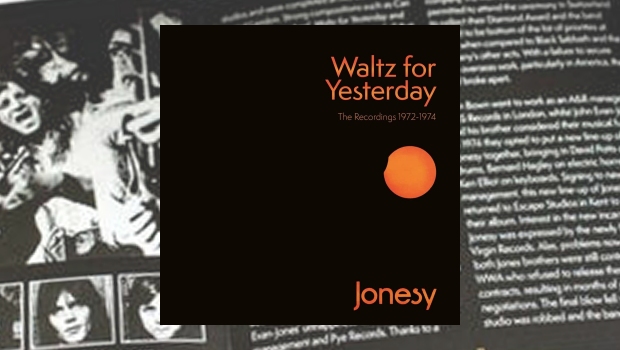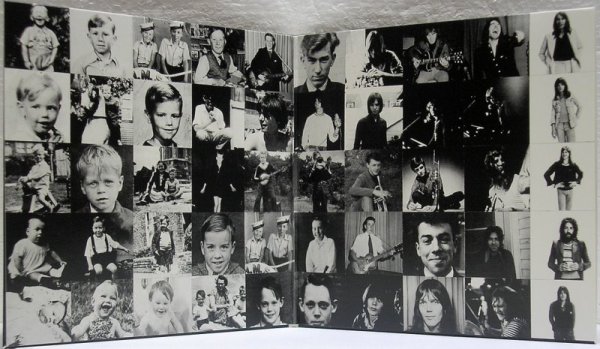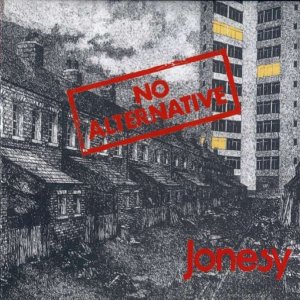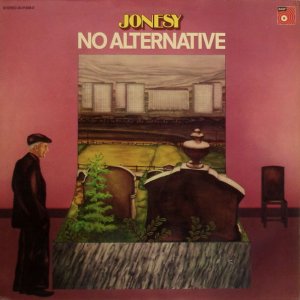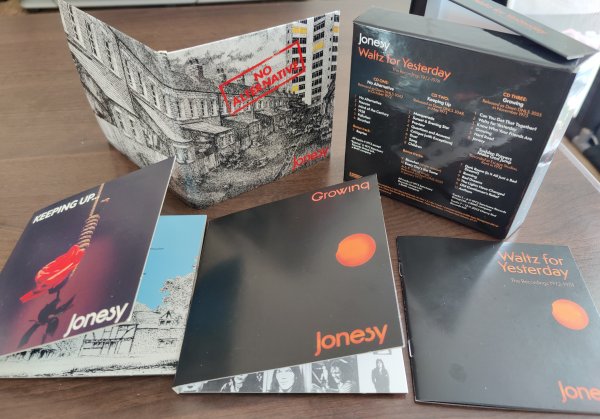My first brush with Jonesy was in 2011 when I reviewed the bizarre Dark Matter (Inner Space), apparently a mish-mash of old recordings and new sound effects. Looking back, I cannot fathom why I gave it 7 out of 10, as I never listened to it again after reviewing. That is, until I was in the process of preparing for this review. Upon re-listening, it was downright awful, a few good ideas drowned in a sea of poor ones. And it honestly sounded nothing like the original Jonesy whatsoever, but some strange lo-fi Pink Floyd knock-off band.
I remember being startled when I found out that the history of Jonesy stretched back 40 years (now 50 years!). To research for the review, I had to know what Jonesy actually sounded like, and fortunately they were on Spotify for me to try. I was quickly smitten. Oddly enough, my go-to track was Heaven, a long, slow, repetitive, melancholy track that is drenched in Mellotron. This track is often discarded by fans as one of the most boring prog songs ever, and they’re absolutely right of course. But the atmosphere of the song would tap into something deep within me, and I replayed that song for months.
I held off on purchasing the CD collection for a while, as I was a bit of a stickler for album art at the time and was hoping to find individual album releases that would present the full artwork. But when no such reissue appeared, I caved and bought Esoteric’s own 2007 2CD collection Masquerade – The Dawn Years Anthology, which comprised the three albums No Alternative, Keeping Up… and Growing as well as some bonus tracks. As I feared, Esoteric had butchered the album art, only retaining the front covers of each album, with the first two appearing in the booklet and the third – gulp – shown behind the clear plastic that holds the CD. It was a pretty ugly set, to say the least, but the music was well worth it.
Jump to this year, I had been reminded of the band because I had wanted to recommend bassists who played in a melodic style like Chris Squire. Jonesy was one such band, and I had recommended Ricochet and No Alternative to a friend. I proceeded to listen to the songs myself on Spotify, and when they were done, Spotify played the next related track, which I had not heard before, but was nevertheless very enjoyable. To my surprise, it was also by Jonesy; it was Running from their album Sudden Prayers Make God Jump. I was aware that this album existed (it had been on ProgArchives for as long as I had been aware of the band), but I never had sought it out, since it had been dated to 2002 and had a poor rating; I presumed it was another latter-day work that failed to live up to the earlier material. I was pleasantly surprised at the quality of Running and decided to listen to the rest of Sudden Prayers Make God Jump. It was all pretty good indeed.
Quite separate to this, I was looking at Esoteric’s latest release roster to decide what I wanted to add to my collection next, and sure enough, there was Waltz for Yesterday – The Recordings 1972-1974. And to my delight, the full Sudden Prayers Make God Jump album was included as bonus tracks on Disc 3. It turns out that this album was in fact recorded in 1974, but was shelved and the master tapes were subsequently stolen. The 2002 release used a cassette tape as the source; consequently the sound quality was very poor and the recording was speeded up. You can hear this version below.
Somehow – and I wish the accompanying booklet had gone into more detail here – the 1974 master tapes were rediscovered last year, 47 years after their recording date. A newly restored version of the album was made so that now listeners can hear this album as it was meant to be heard, and at the correct speed. Esoteric has rightly updated their Jonesy product from Masquerade to Waltz for Yesterday so that Sudden Prayers Make God Jump is presented alongside its three predecessors.
Incidentally, I often wonder how Esoteric chooses the names for their anthology sets. For Fruupp it was Wise as Wisdom and Jonesy is now updated from Masquerade to Waltz for Yesterday. All are songs from the set, but at this point it seems as if Esoteric picks the names out of a hat. Waltz for Yesterday is one of the worst songs in the collection, it’s not representative of what the band did altogether and it’s a terrible name for a song and for an anthology. Imagine if the Beatles’ studio albums collection was titled Ob-la-di, Ob-la-da – The Recordings 1962-1969.
Jonesy’s first album was No Alternative, and I seem to be in the minority when I consider it to be the band’s finest. Of the six tracks featured, there are none that I actively dislike, and three which I play regularly. The first is the album opener and title track which starts strangely with a musty recording of a marching band playing a tune that I will probably never know the name of. Abruptly this changes to a remarkably simple yet effective prog theme that features silence every other bar. It seems so simple and comedic, it’s as if a child composed it, but I admire the balls of the band to play it so confidently. The band then launch into the verse section that is undeniably heavy with its Mellotron blasts, distorted angry vocals and heavy bass section. Drummer Jim Payne holds together a solid rhythm featuring four consecutive bass drum beats, somewhat tiring to pull off with a single pedal, but ideal for a beginner double-pedal learner to pull off; can you tell I’ve often used this song to practise my technique?
Heaven has already been discussed above, but provides a light (if long) antidote to the heavy rock of No Alternative. Mind of the Century is a bit of a snooze-fest, with a plodding rhythm, monotonous chord progression and repetitive sound. 1958 brings the listener into jazz-fusion territory, and while it is well played, the repetitive Mellotron stabs in 6/8 do become grating in the song’s 8-minute length; there’s not quite enough variety to justify that length.
The same cannot be said for the 10-minute Pollution, the most symphonic-sounding track on the album, with clearly divided sections that flow into each other. The instrumental parts of this song are some of the best the band ever recorded. Bassist David Paull clearly takes a leaf from Chris Squire’s book as his bass is super melodic and very audible in the mix; Yes fans will be pleased. Honestly, Pollution seems like it could have been recorded by a different band, it’s that different from the rest of the album in terms of composition – though not timbre.
The debut album finishes on a high with the infinitely catchy Ricochet. I defy anyone to put this song on and not find some part of their body moving along to the rhythm laid down by Paull and Payne. Never has Mellotron worked better in a pop-rock setting.
The album concludes with a reprise of the marching band sound. Why this stock recording was used to bookend the album, I have no idea. The accompanying booklet unfortunately offers no insight, which I find to be a great shame. Esoteric founder Mark Powell’s essay is certainly informative – I had no idea, for example, that the Jones brothers (whose name constitutes the band’s) came from Tasmania originally – but does lack detail in some crucial areas. The music itself is rarely analysed or discussed, with the emphasis put on band member movements during the group’s brief tenure. This leads to a lot of questions about the music going sadly unanswered. Why do all three albums sound so different? Why do the band seem to have absolutely no sense of direction, when every song sounds completely different from the last? Why did they decide to do a free-form improv track on album two? Maybe we’ll never know.
Keeping Up… is, according to Mark Powell, “a massive leap forward in terms of creativity and content from No Alternative.” Hogwash. There are great songs on this album, but there are stinkers too. Masquerade is a great prog opener, with a contrasting slow middle section that balances the speedy verses. Gypsy Jones takes over the bass role from this album onwards, but fortunately with a similar style to Paull so the transfer isn’t too noticeable, and the bass sound remains impeccable here.
Sunset & Evening Star is some sort of weak I Talk to the Wind impersonator, albeit with a strong Mellotron theme. The instrumental Preview leads nicely into Questions and Answers, a playful prog track that features a somewhat out-of-place salsa jazz outro that goes on just a bit too long.
Side 2 kicks off with the 9-and-a-half minute free-form Critique (with Exceptions) which is simply awful. I can’t help but think this was inspired by the lengthy instrumental improvisation in Moonchild – the band had already taken a lot of leaves from King Crimson’s book – but this track, which takes up a quarter of the album’s run time, has none of the atmospherics of Crim’s. It’s just the band noodling aimlessly for the best part of 10 minutes with a poem at the start. I would have loved to hear some sort of justification for this track in the booklet, but alas, there is none.
Then there is Duet, less than a minute long, featuring a simple theme played on two instruments. At this point, it seems as if Jonesy is happy to commit just about any odd recording to disc, with no concern for how entertaining or interesting it is. This is followed by Song; it seems the band are no longer sure how to title their pieces. However, it’s an enjoyable single-length anti-war track with some memorable lyrics and a good hook. I’m particularly fond of the line:
Until someone finds a new death cause.”
There’s just enough time for Keeping Up…’s masterpiece, the answer to Pollution: Children. Symphonic as they come, this track features a string quartet which emphasises the exciting instrumental section. The song is balanced with more relaxed sections, such as the laid-back outro that features a deft interplay between Gypsy Jones on bass and newcomer Plug Thomas on drums, a feature that would be revisited on the title track of the subsequent album, Growing.
The last official album kicks off with the fun Can You Get That Together?, seemingly designed to get you dancing. Though boasting an impressive 8-and -a-half minute run time, this song doesn’t feel that progressive to me, more of a showcase for some virtuosity with solos by all members of the band. It doesn’t inspire further listening for me.
Waltz for Yesterday, chosen as the title of the anthology, starts off with some melancholic drawling verses interspersed with an oddly upbeat classical theme played on trumpet and violins. This leads into a haphazard jazz outro that is really jarring in tone. I’m so confused at this point.
Know Who Your Friends Are is probably the best track on the album, with tight contrasting sections supporting enjoyable hooks. However, both this track and the title track feature an off-putting guitar sound that is distorted into a ‘wobble’. Just listening to it makes me feel sea-sick, as if the brain is perceiving motion obtained from having the pitch bend. It’s worth making it through Growing though to get to the thoroughly planned-out outro.
Hard Road just sounds so ’70s, it really hasn’t aged well. The song proper only fits in the first half of the run-time, with the remainder dedicated to another noodly jazzy outro. I really don’t know why critics seem to think this is the best Jonesy album.
At nearly 12-minutes, you’d hope the final track Jonesy would have a lot to offer, but instead it is a total waste of time, another free-form instrumental augmented by orchestral sounds. There are no interesting themes, just ten minutes of the band trying to start something but getting nowhere. It’s very disappointing.
This leads to Sudden Prayers Make God Jump. By this time, trumpeter Alan Bown, Mellotron player Jamie Kaleth and drummer Plug Thomas had left the band, with only brothers John Evan-Jones and Gypsy Jones remaining. As a result, this album sounds almost nothing like the previous albums, and one could be forgiven for thinking this was a different band altogether. Then again, no two Jonesy songs sound alike anyway. Most notably, the Mellotrons that dominated Jonesy’s previous three albums are gone, replaced by synthesisers closer to Keith Emerson’s sound.
This album was a concept album about a man in a lunatic asylum with maniacal laughter kicking off the album and various psychological lyrical themes accompanying each song. Opener Dark Room (Is It All Just a Bad Dream?) is suitably catchy and dark, although at 9-minutes it outstays its welcome somewhat, with an outro that could have been tidied up and made snappier. In fact, the entire album has a somewhat unpolished sound; perhaps these were demos that were going to be workshopped into tighter pieces. That being said, there was a lot of flab on Growing, so this could simply be following suit.
Running was the first track I heard from this album and it reinvigorated my interest in the group. With a speedy pace and tight interplay, there’s much for the vintage prog fan to enjoy here. Bad Dreams is a little cringe, it’s about as evil-sounding as a villain in a pantomime play and features another outro that is far too long. The Lights Have Changed sees Jonesy getting their Yes on, with a “do-do-do” refrain that does get a little annoying, but some fun instrumental sections to make up for it. Again, super long outro.
Jonesy apparently doesn’t believe in phrasing with the song Old Gentleman’s Relief. It’s a slower, more melancholic track with a low vocal that is somewhat reminiscent of their Dark Matter (Inner Space) album. Anthem completes the set on a more positive note, in a major key played on the piano with flute accompaniment. Unfortunately, despite the title, it isn’t particularly anthemic, but is rather soft instead. With the lyrical section done, you’d better believe Jonesy do what they do best: devote the second half of the song – 2-and-a-half minutes – to the repetitive outro! Yay!
While Sudden Prayers Make God Jump is definitely a valuable addition to the anthology, it would hardly have been a breakthrough album for Jonesy if it had been released in 1974. This is tepid prog with a lot of flab laying about, especially in the outro department. Why doesn’t the band know when to end a song?
Esoteric have put together a fantastic package to celebrate the work of Jonesy. Far from the paltry 2CD set from 2007, Waltz for Yesterday finally houses the three albums in their original artwork; all three original albums are presented in gatefold slipcases that restores all the artwork. My favourite artwork – unsurprisingly – is for No Alternative which presents an intricate dystopian line drawing of drab terraced houses overshadowed by a towering block of flats, with the album title seemingly stamped on the the front as if to say “This is what Britain is coming to, and there is No Alternative”. Whether this is what the artwork is supposed to represent, we don’t know; again the booklet sheds no insight. Ironically enough, however, there was an alternative cover for No Alternative featuring gravestones that had somehow made their way inside a building that was used for the German BASF label. This artwork is featured in mini form inside the booklet.
When I was adding the tracks to my library, I was excited to see that “(Remastered 2022)” was affixed to each. However, if remastering has truly happened, then the changes are too insignificant for my ear. To me, the 2007 versions and 2022 versions are sonically identical, so don’t go buying this set if you are expecting the music to sound better than before, unless, of course, you’re talking about Sudden Prayers Make God Jump.
While they probably aren’t the best prog band you’ve never heard of, the unpretentiously titled Jonesy are still worth a look-in with their decidedly eclectic style. There are hits here and there are misses but Jonesy play them all with confidence, brilliance evading them ever so slightly. Waltz for Yesterday is the best way to enjoy this enigmatic and occasionally infuriating band in all its glory.
TRACK LISTING
CD 1: No Alternative (1972)
01. No Alternative (8:15)
02. Heaven (8:12)
03. Mind Of The Century (4:11)
04. 1958 (7:53)
05. Pollution (9:41)
06. Ricochet (5:00)
~ Bonus Track:
07. Reprise (1:05)
Time – 44:15
CD 2: Keeping Up… (1973)
01. Masquerade (6:05)
02. Sunset & Evening Star (3:37)
03. Preview (2:00)
04. Questions And Answers (5:13)
05. Critique (With Exceptions) (9:30)
06. Duet (0:53)
07. Song (3:29)
08. Children (9:03)
~ Bonus Tracks:
09. Ricochet [single version] (4:06)
10. Every Day’s The Same (4:33)
Time – 48:21
CD 3: Growing (1973)
01. Can You Get That Together? (8:27)
02. Waltz For Yesterday (4:11)
03. Know Who Your Friends Are (6:12)
04. Growing (5:01)
05. Hard Road (3:53)
06. Jonesy (11:42)
Sudden Prayers Make God Jump (1974)
07. Dark Room (Is It All Just A Bad Dream?) (8:57)
08. Running (4:59)
09. Bad Dreams (6:28)
10. The Lights Have Changed (6:36)
11. Old Gentleman’s Relief (6:46)
12. Anthem (4:52)
Time – 78:01
Total Time – 170:37
MUSICIANS
John Evan-Jones – Guitar, Vocals
Trevor “Gypsy” Jones – Bass Guitar, Vocals (CDs 2 & 3)
Jamie Kaleth – Mellotron, Keyboards, Electric Piano, Grand Piano, Vocals (all except Sudden Prayers Make God Jump)
Alan Bown – Electric Trumpet, Electric Flugelhorn, Percussion (CDs 2 & 3)
Richard “Plug” Thomas – Drums, Percussion, Vocals (CDs 2 & 3)
~ With:
David Paull – Bass Guitar, Vocals (CD1 and CD2 tracks 9 & 10)
Jim Payne – Drums, Percussion (CD1 and CD2 tracks 9 & 10)
Bernard Hagley – Electric Saxophones (CD3)
Morris Pert – Percussion (CD3)
David Potts – Drums, Percussion (Sudden Prayers Make God Jump)
Ken Elliott – Keyboards (Sudden Prayers Make God Jump)
ADDITIONAL INFO
Record Label: Esoteric Recordings
Catalogue Number: ECLEC 32788
Country of Origin: U.K.
Date of Release: 25th February 2022
LINKS
Jonesy – Cherry Red Product Page

